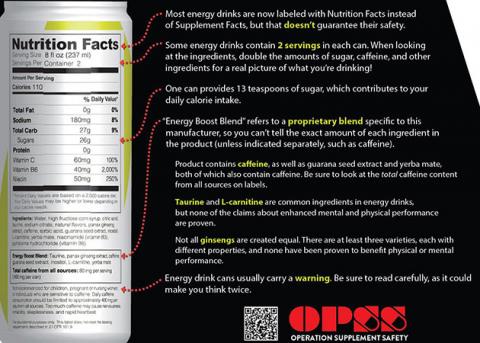Get the gulp on energy drinks

When you feel like you're dragging and perhaps lacking in sleep, reaching for an energy drink may be a tempting option for a boost or just a tasty beverage with a little extra "kick." Although on occasion, one of these may be your "quick fix," using energy drinks habitually or throughout the day, instead of eating a nutritious diet and getting adequate sleep, is not a healthy habit.
Here is some guidance to assist you in consuming energy drinks safely.
- Be aware of caffeine content. Consuming multiple energy drinks throughout the day is not the best choice in promoting optimal performance and may result in excessive caffeine consumption. Too much caffeine may result in symptoms such as nervousness, shakiness, rapid heart rate and trouble sleeping. Across the many brands of energy drinks, caffeine can range from 20 to 316 mg per 8 oz. serving. Read the Operation Supplement Safety (OPSS) FAQ about caffeine to learn how to use caffeine effectively.
- Pay attention to serving sizes. The Dietary Guidelines for Americans recommend that Americans focus attention to the serving size and the corresponding servings per container on the Nutrition Facts (or Supplement Facts) label to assist in making the best choices for their overall health, performance and wellness goals. Just like many products, some energy drink cans provide two servings, which can mean double the amount of calories, sugar and, in the case of energy drinks, caffeine.
- Limit calories from added sugar. The Dietary Guidelines for Americans also recommend we limit the calories in our diets from added sugar to no more than 10 percent. This is about equal to 50 grams or less of added sugar for someone on a 2,000 calorie per day diet. Some energy drinks may have as much as 13 teaspoons of table sugar (sucrose) per can. This is about 52 grams of table sugar. Be sure to always look at the Nutrition Facts label on all your beverages as a healthy habit in making informed decisions. To quench your thirst, water is best because it has no added sugars or calories.
- Check energy drink labels. Also be sure to evaluate the ingredients list on the energy drink label. Caffeine is found in other ingredients such as guarana, green coffee bean, green tea and yerba maté. The labels provide the total caffeine content from all sources, but it may be listed "per oz.," "per serving," or "per can," so you may have to do some math in your head.
In addition, the Nutrition Facts label doesn't currently provide the actual grams of added sugar, and as we all know, added sugar has many other names like sucrose, high fructose corn syrup, agave nectar, molasses, cane juices, maltose, dextrose, malts. In fact, there are more than 56 names for added sugar. For example, "cane," "syrup," "malts" and ingredients with "ose" at the end of their names (fructose, sucrose and dextrose) are all sugars. - More is not better. If you drink these beverages, more is not better. When using energy drinks, be aware of how much caffeine you're consuming and remember that they are not sports drinks and will not hydrate you. Know that hydration with water, along with getting adequate sleep and eating a nutritious diet are the best tools in assuring you have energy and perform at your optimal level.
- Avoid use close to bedtime. To assist with getting adequate sleep, don't consume an energy drink six hours before bedtime.
- Heed warnings regarding child use. Finally, parents of children under 18 should read the recommendations from the American Academy of Pediatrics, which warn against the use of energy drinks by children and adolescents, and other guidelines submitted by professional organizations.
For more information, visit OPSS.org.
(About the authors: Patricia Deuster is professor and director at CHAMP, the Consortium for Health and Military Performance; Andrea Lindsey is a senior nutrition scientist with CHAMP and director of operation supplement safety; Caitlin Wong is a nutrition education specialist with CHAMP)
